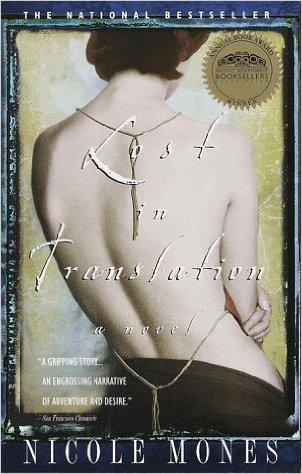
Nicole Mones: Desire, identity and love
Reading and writing interweave like lovers in a small bed. While working on Forbidden Fruit – 1980 Beijing, a Memoir friends often asked, Are you reading everything on China? The answer often surprised them. No. Since I was trying to stay true to the knowledge available to me about China in 1980-81, I wasn’t reading the hundreds of books published since then. No. That would have required an encyclopedic non-fiction academic book. And to read all of that while writing a memoir about Beijing 35 years ago would have required a mental contortion besides being dishonest about what I understood about China—my consciousness— in 1980.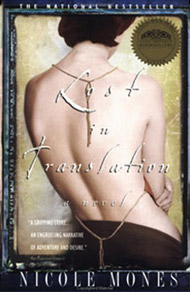
When I arrived in Beijing, China had been closed to Westerners for almost three decades. American journalists had just recently set up shop. North American scholars were trying to get visas. Chinese writers, emerging from 25 years of punitive constrictions were just beginning to write again with Western translators and publishers trailing. Since then, of course, there has been a cornucopia of writing from Chinese who fled, Chinese who stayed, and Western scholars sometimes working with Chinese colleagues. But that wasn’t available to me in 1980-81 as I tried to comprehend the planet I had landed on.
A few books, published since 1981, were critical for reference sources of information that I touched upon, like the statistics of persecution and deaths during the Cultural Revolution. Mostly I returned to books and authors that were available to me in an earlier period that had helped to shape my ideas about China before I left for Beijing—Pearl Buck’s The Good Earth, Edgar Snow’s Red Star Over China, Agnes Smedley, Franz Schurmann, Orville Schell, John Fairbanks, Mark Selden, David & Isabel Crook, Merle Goldman, William Hinton, Anna Louise Strong, Simon Leys. In Beijing, I had discovered Lu Xun, Ding Ling and Dreams of the Red Chamber by Cao Yueqin and poems by Du Fu as well as the new Scar short stories revealing the pains and sorrows from crimes committed during the Cultural Revolution. I returned to all of them for reference while I was writing.
More often, though, my deep reading while writing had to do with the enterprise of writing itself. Not how-to books, but literature to nourish my soul and ignite my imagination. Writing that stimulates and inspires. On any given night, my bed stand offered an unpredictable list. From Virginia Woolf to Michael Ondaatje, from Marguerite Duras to Maxine Hong Kingston, from Edwidge Danticat to Flaubert, from Elizabeth Gilbert to Juan Rulfo, Lily King to Albert Camus. Gornick, Gogol, Karr, Zola, Laurence, Proust and Hampl. Fiction, memoir, biography. And many of the usual American suspects: Faulkner, Hemingway, Baldwin, Cather, Stegner. There were other writers whom I adore but they didn’t feel quite right for my writing mojo for this book. And, to be honest, sometimes I didn’t finish all these books…but there was always something I learned from these remarkable writers.
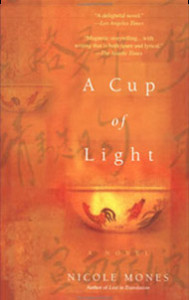 But nothing exploded my senses and stimulated my desire to keep writing like a series of novels by Nicole Mones. She has written four novels set in China. (So I was cheating a bit about my motto to not read China work since 1981) Three of Mones’ novels take place in the post boom China of the 1990s and oughts while one takes place in Shanghai during the late 30s leading into WWII. Historical fiction is a personal weakness, but Mones centers each novel around a love story with a strong thirty’s something woman at the nucleus, rendered with seductively rich detail and intellectually intriguing themes. And each novel threads Mandarin expressions—in Pinyin—to offer teasing peeks into Chinese thinking and feeling.
But nothing exploded my senses and stimulated my desire to keep writing like a series of novels by Nicole Mones. She has written four novels set in China. (So I was cheating a bit about my motto to not read China work since 1981) Three of Mones’ novels take place in the post boom China of the 1990s and oughts while one takes place in Shanghai during the late 30s leading into WWII. Historical fiction is a personal weakness, but Mones centers each novel around a love story with a strong thirty’s something woman at the nucleus, rendered with seductively rich detail and intellectually intriguing themes. And each novel threads Mandarin expressions—in Pinyin—to offer teasing peeks into Chinese thinking and feeling.
Mones’ novels excavate to astonishing depths different facets of Chinese culture, politics, and history. In her first novel, Lost in Translation (no relationship to the movie), 1998, the world of archeology combined with the punitive legacy of the Cultural Revolution wraps around an erotic and romantic plot that parallels an unrequited love tale of historical figures of early 20th China. The search for bones of Peking Man—lost during WWII—takes a team of Chinese and American archeologists to a banned region of China where missiles are hidden in caves and notorious labor reform camps once housed victims of purification movements. It is a masterpiece in inter-cultural sensitivity. Mones’ insights into how Westerners, outsiders, see the Chinese and their culture countered with a surprising knowledge of how the Chinese perceive Westerners expands cross-cultural understanding in ways that I have rarely witnessed.
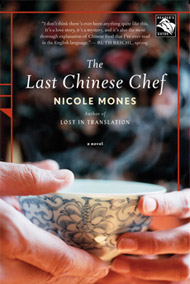 In her A Cup of Light (2002) Mones digs into the high-end porcelain trade and its focus on forgery. Between shady government sources, illegally acquired collections, greedy western collectors, and sometimes unscrupulous middlemen, there is a world of exquisitely crafted forgeries. Mones’ story challenges our very idea of authenticity. Isn’t the highly gifted forger or copier as important as the original artist if nobody detects the copy? Meanwhile the author’s eloquent descriptions of the artistry of porcelain painting transform our aesthetic ideas. Only through this novel could the average person understand why a Chinese collector recently paid $35 million for something called “the Chicken cup.” Mones’ smart female protagonist meanwhile exhibits a practice of memorizing and recall that provokes an exploration of the philosophy of memory training with it’s focus on space and metaphor. Like all of Mones’ novels it surrounds a seductive plot with intellectual pleasures.
In her A Cup of Light (2002) Mones digs into the high-end porcelain trade and its focus on forgery. Between shady government sources, illegally acquired collections, greedy western collectors, and sometimes unscrupulous middlemen, there is a world of exquisitely crafted forgeries. Mones’ story challenges our very idea of authenticity. Isn’t the highly gifted forger or copier as important as the original artist if nobody detects the copy? Meanwhile the author’s eloquent descriptions of the artistry of porcelain painting transform our aesthetic ideas. Only through this novel could the average person understand why a Chinese collector recently paid $35 million for something called “the Chicken cup.” Mones’ smart female protagonist meanwhile exhibits a practice of memorizing and recall that provokes an exploration of the philosophy of memory training with it’s focus on space and metaphor. Like all of Mones’ novels it surrounds a seductive plot with intellectual pleasures.
In The Last Chinese Chef (2007) Mones mines the rarefied world of the most elite chefs in China. We learn that the famous chefs to the aristocracy were summarily demoted and humiliated when the Communists took over. Some left the country. When the son of one such exile returns a suspenseful and poignant story unfolds, but again it’s encircled by a slowly evolving romance. Although there are two love affairs here—one human, one culinary.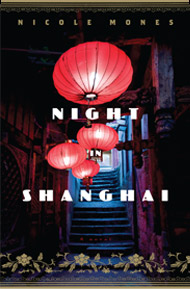
Mones’ recent novel, Night in Shanghai (2014) takes us to the exotic heart and turbulent world of Shanghai as World War II is approaching. The central character is an African American jazz musician who finds opportunities, recognition and space to breathe freely in Shanghai that is unavailable back in the U.S. The story is based on real-life characters—American jazzmen, underground Communists, Nationalist Generals and Japanese collaborators. Growing tensions between these political forces heighten the erotic romance at the center of the novel. Jazz provides a sultry sound track. The catastrophe of the encroaching war unravels everything.
While I am staggered by Mones’ ability to turn extensive research into lush and compelling stories, perhaps I am simply seduced by her themes of desire, identity and love.
Nicole Mones began visiting China in the late ‘70s while working in the textile industry. She traveled back and forth to China with her work for seventeen years before writing her first novel.

2 thoughts on “Nicole Mones: Desire, identity and love”